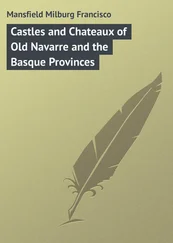Milburg Mansfield - Dumas' Paris
Здесь есть возможность читать онлайн «Milburg Mansfield - Dumas' Paris» — ознакомительный отрывок электронной книги совершенно бесплатно, а после прочтения отрывка купить полную версию. В некоторых случаях можно слушать аудио, скачать через торрент в формате fb2 и присутствует краткое содержание. Издательство: Иностранный паблик, Жанр: foreign_prose, Путешествия и география, на английском языке. Описание произведения, (предисловие) а так же отзывы посетителей доступны на портале библиотеки ЛибКат.
- Название:Dumas' Paris
- Автор:
- Издательство:Иностранный паблик
- Жанр:
- Год:неизвестен
- ISBN:нет данных
- Рейтинг книги:4 / 5. Голосов: 1
-
Избранное:Добавить в избранное
- Отзывы:
-
Ваша оценка:
- 80
- 1
- 2
- 3
- 4
- 5
Dumas' Paris: краткое содержание, описание и аннотация
Предлагаем к чтению аннотацию, описание, краткое содержание или предисловие (зависит от того, что написал сам автор книги «Dumas' Paris»). Если вы не нашли необходимую информацию о книге — напишите в комментариях, мы постараемся отыскать её.
Dumas' Paris — читать онлайн ознакомительный отрывок
Ниже представлен текст книги, разбитый по страницам. Система сохранения места последней прочитанной страницы, позволяет с удобством читать онлайн бесплатно книгу «Dumas' Paris», без необходимости каждый раз заново искать на чём Вы остановились. Поставьте закладку, и сможете в любой момент перейти на страницу, на которой закончили чтение.
Интервал:
Закладка:
The ethics of plagiarism are still greater and more involved than those which make justification for the employment of one who makes a profession of library research , but it is too involved and too vast to enter into here, with respect to accusations of its nature which were also made against Dumas.
As that new star which has so recently risen out of the East – Mr. Kipling – has said, “They took things where they found them.” This is perhaps truthful with regard to most literary folk, who are continually seeking a new line of thought. Scott did it, rather generously one might think; even Stevenson admitted that he was greatly indebted to Washington Irving and Poe for certain of the details of “Treasure Island” – though there is absolutely no question but that it was a sort of unconscious absorption, to put it rather unscientifically. The scientist himself calls it the workings of the subconscious self.
As before said, the Maquet affaire was a most complicated one, and it shall have no lengthy consideration here. Suffice to say that, when a case was made by Maquet in court, in 1856-58, Maquet lost. “It is not justice that has won,” said Maquet, “but Dumas.”
Edmond About has said that Maquet lived to speak kindly of Dumas, “as did his legion of other collaborateurs ; and the proudest of them congratulate themselves on having been trained in so good a school.” This being so, it is hard to see anything very outrageous or preposterous in the procedure.
Blaze de Bury has described Dumas’ method thus:
“The plot was worked over by Dumas and his colleague, when it was finally drafted by the other and afterward rewritten by Dumas.”
M. About, too, corroborates Blaze de Bury’s statement, so it thus appears legitimately explained. Dumas at least supplied the ideas and the esprit .
In Dumas’ later years there is perhaps more justification for the thought that as his indolence increased – though he was never actually inert, at least not until sickness drew him down – the authorship of the novels became more complex. Blaze de Bury put them down to the “Dumas-Legion,” and perhaps with some truth. They certainly have not the vim and fire and temperament of individuality of those put forth from 1840 to 1850.
Dumas wrote fire and impetuosity into the veins of his heroes, perhaps some of his very own vivacious spirit. It has been said that his moral code was that of the camp or the theatre; but that is an ambiguity, and it were better not dissected.
Certainly he was no prude or Puritan, not more so, at any rate, than were Burns, Byron, or Poe, but the virtues of courage, devotion, faithfulness, loyalty, and friendship were his, to a degree hardly excelled by any of whom the written record of cameraderie exists.
Dumas has been jibed and jeered at by the supercilious critics ever since his first successes appeared, but it has not leavened his reputation as the first romancer of his time one single jot; and within the past few years we have had a revival of the character of true romance – perhaps the first true revival since Dumas’ time – in M. Rostand’s “Cyrano de Bergerac.”
We have had, too, the works of Zola, who, indomitable, industrious, and sincere as he undoubtedly was, will have been long forgotten when the masterpieces of Dumas are being read and reread. The Mousquetaire cycle, the Valois romances, and “Monte Cristo” stand out by themselves above all others of his works, and have had the approbation of such discerning fellow craftsmen as George Sand, Thackeray, and Stevenson, all of whom may be presumed to have judged from entirely different points of view. Thackeray, indeed, plainly indicated his greatest admiration for “La Tulipe Noire,” a work which in point of time came somewhat later. At this time Dumas had built his own Chalet de Monte Cristo near St. Germain, a sort of a Gallic rival to Abbotsford. It, and the “Théâtre Historique,” founded by Dumas, came to their disastrous end in the years immediately following upon the Revolution of 1848, when Dumas fled to Brussels and began his “Mémoires.” He also founded a newspaper called Le Mousquetaire , which failed, else he might have retrenched and satisfied his creditors – at least in part.
He travelled in Russia, and upon his return wrote of his journey to the Caspian. In 1860 he obtained an archæological berth in Italy, and edited a Garibaldian newspaper.
By 1864, the “Director of Excavations at Naples,” which was Dumas’ official title, fell out with the new government which had come in, and he left his partisan journal and the lava-beds of Pompeii for Paris and the literary arena again; but the virile power of his early years was gone, and Dumas never again wielded the same pen which had limned the features of Athos, Porthos, Aramis, and D’Artagnan.
In 1844 Dumas participated in a sort of personally-conducted Bonapartist tour to the Mediterranean, in company with the son of Jerome Napoleon. On this journey Dumas first saw the island of Monte Cristo and the Château d’If, which lived so fervently in his memory that he decided that their personality should be incorporated in the famous tale which was already formulating itself in his brain.
Again, this time in company with the Duc de Montpensier, he journeyed to the Mediterranean, “did” Spain, and crossed over to Algiers. When he returned he brought back the celebrated vulture, “Jugurtha,” whose fame was afterward perpetuated in “Mes Bêtes.”
That there was a deal of reality in the characterization and the locale of Dumas’ romances will not be denied by any who have acquaintance therewith. Dumas unquestionably took his material where he found it, and his wonderfully retentive memory, his vast capacity for work, and his wide experience and extensive acquaintance provided him material that many another would have lacked.
M. de Chaffault tells of his having accompanied Dumas by road from Sens to Joigny, Dumas being about to appeal to the republican constituency of that place for their support of him as a candidate for the parliamentary elections.
“In a short time we were on the road,” said the narrator, “and the first stage of three hours seemed to me only as many minutes. Whenever we passed a country-seat, out came a lot of anecdotes and legends connected with its owners, interlarded with quaint fancies and epigrams.”
Aside from the descriptions of the country around about Crépy, Compiègne, and Villers-Cotterets which he wove into the Valois tales, “The Taking of the Bastille,” and “The Wolf-Leader,” there is a strong note of personality in “Georges;” some have called it autobiography.
The tale opens in the far-distant Isle of France, called since the English occupation Mauritius, and in the narrative of the half-caste Georges Munier are supposed to be reflected many of the personal incidents of the life of the author.
This story may or may not be a mere repetition of certain of the incidents of the struggle of the mulatto against the barrier of the white aristocracy, and may have been an echo in Dumas’ own life. It is repeated it may have been this, or it may have been much more. Certain it is, there is an underlying motive which could only have been realized to the full extent expressed therein by one who knew and felt the pangs of the encounter with a world which only could come to one of genius who was by reason of race or creed outclassed by his contemporaries; and therein is given the most vivid expression of the rise of one who had everything against him at the start.
This was not wholly true of Dumas himself, to be sure, as he was endowed with certain influential friends. Still it was mainly through his own efforts that he was able to prevail upon the old associates and friends of the dashing General Dumas, his father, to give him his first lift along the rough and stony literary pathway.
Читать дальшеИнтервал:
Закладка:
Похожие книги на «Dumas' Paris»
Представляем Вашему вниманию похожие книги на «Dumas' Paris» списком для выбора. Мы отобрали схожую по названию и смыслу литературу в надежде предоставить читателям больше вариантов отыскать новые, интересные, ещё непрочитанные произведения.
Обсуждение, отзывы о книге «Dumas' Paris» и просто собственные мнения читателей. Оставьте ваши комментарии, напишите, что Вы думаете о произведении, его смысле или главных героях. Укажите что конкретно понравилось, а что нет, и почему Вы так считаете.












